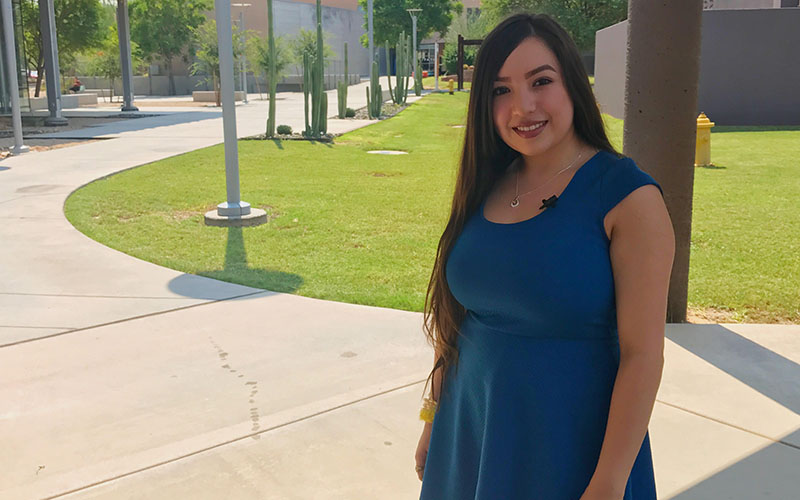
Liliana Reyes, a third-time participant of the DACA program, doesn’t know if her dream of becoming a teacher will ever become a reality. (Photo by Alex Valdez/Cronkite News)
PHOENIX – Shock, fear and uncertainty are all common feelings for Liliana Reyes during this time period of her life. Just nearly a week after learning of President Donald Trump’s decision to end the Deferred Action for Childhood Arrivals program, Reyes, a third-time DACA recipient, is trying to put together a plan for a future that seems uncertain.
Out of the 800,000 recipients nationwide, 28,000 of those are currently working or receiving an education in the state of Arizona.
Reyes is just one of the thousands who were brought to Arizona as a child. Reyes’ mother, Rosa Cervantes, migrated to the U.S. with hopes of giving her children the possibility of obtaining their own “American Dream.”
“I was brought to the United States when I was a-year-and-a-half. I was born in Michoacán, Mexico, and I have not been back since,” said Reyes.
Reyes woke up the morning of Sept. 5 feeling tossed aside by the president. She now feels her dreams of becoming an elementary school teacher are a far-away reality.
Reyes, holding back tears, said, “I was feeling really sad, scared because, like, what’s next? What is happening? What is going to happen to us now?”
Reyes took full advantage of the program working a full time job while still pursuing an education. In May 2017, she said she only reached half of her American dream. Reyes received an associate’s degree in elementary education from South Mountain Community College.
“I want to pursue my bachelor’s degree in elementary education with Northern Arizona University that is offered through South Mountain, but with this news I do not know what is going to happen,” she said. “I can only do so much. I can have the wants and the dreams but if people are taking that away from me, how can I proceed with my career?”
The current administration is giving participants whose permits expire before March 5, 2018, until Oct. 5 of this year to re-apply. The program is no longer accepting new applications for DACA.
Immigration and education law attorney Phil Ortega is just one of many immigration lawyers across the Valley who are offering help to DACA recipients during the application renewal process.

Phil Ortega, an immigration and education lawyer, talks about what DACA holders should do next. (Photo by Alex Valdez/Cronkite News)
“According to the numbers we are hearing, there are 200,011 DACA recipients currently that expire before March 5, 2018, that are in need of renewals by next month,” he said.
Ortega advises that large number of DACA holders to get a consultation from an attorney immediately.
“If they need help with their renewals or anything else. Maybe they are eligible for an adjustment of status because many people are eligible for an adjustment of status and just do not know it,” he said.
Ortega said he feels a personal obligation to help, since he has family who have been DACA recipients in the past, along with clients who have faced the same issue and hardships before.
“Right now we are in the planning stage for a DACA renewal drive, where there will be attorneys, volunteers and law students available to help with renewals,” he said.
Reyes said she hopes lawmakers and the president know that DACA recipients are not to blame and that most had no choice but to come with their families.
Reyes said she was not asked, “do you want to go?”
“I was brought here,” she said. “Therefore, I don’t think it is fair that I am being punished for something I did not have control of.”
Reyes added that any mother would do what her mother did to ensure her children have a better future.
“I am pretty sure that anyone in the world can agree with me that they would do anything for their children. I am here. I have been here all my life. It is not fair that I should be treated any differently,” she said.